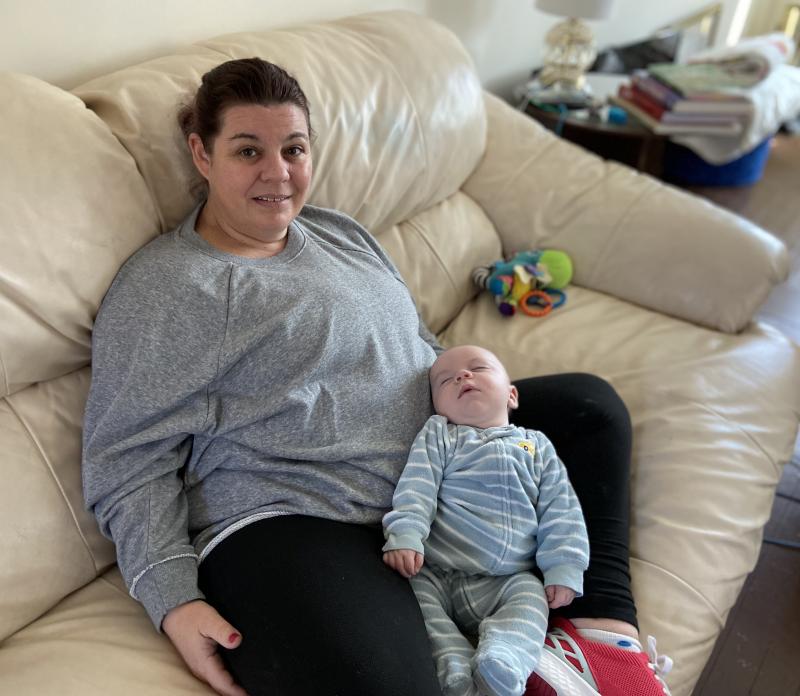COVID leaves lasting effects on Lincoln woman
Paige Deiner’s teenage daughter was recovering from COVID-19 in late September when Paige herself began to feel symptoms of the virus.
The former reporter turned massage therapist was about six months pregnant and taking classes toward a doctorate in medicine when the virus hit her. She has fibromyalgia and has had the Epstein-Barr virus for more than 20 years.
“I knew from the beginning if I got COVID, I would get really sick or it would kill me,” she said, so she took all precautions such as mask-wearing and hand-washing, and had received the first shot in the vaccination series.
A week later, Paige, 41, presented to the emergency room at Bayhealth Hospital, Sussex Campus in Milford coughing up and vomiting blood. A bed wasn’t available, so she spent the night in the ER.
Paige was subsequently diagnosed with COVID, pneumonia and blood clots; she was transferred to Christiana Hospital with a high fever and low oxygen level, finding it difficult to breathe. She spent five weeks in the hospital, a blurred experience in her memory, a surreal state in which Paige said she had crazy dreams and a near-spiritual experience.
She was on a ventilator for 10 days – at one point, she pulled it out and clinicians had to put her back on it – and after it was removed, she said she had hallucinations, memory loss and a distorted perception of reality. Once, in a state of panic, she removed all the lines and tubes connected to her body.
By the end of October, Paige was unable to talk or swallow. When she tried to drink water, she choked. She needed therapy to relearn these skills, and physical therapy to help with mobility issues. She couldn’t get out of bed, and it hurt to move. Paige was transferred to a high-risk pregnancy care unit where she was finally able to shower after a month of hospitalization.
“I felt so clean. It was the best shower ever,” she said, describing how it took her mother four hours to comb the knots out of her hair.
Paige’s OB/GYN and ICU teams worked together to determine medicines she could take that wouldn’t affect her unborn son. A Doppler and contraction monitor constantly observed his heart rate and monitored for any signs of distress. Soren was born four weeks early on Dec. 7, at 6 lbs., 8 oz.
“He’s my miracle baby,” she said. “He’s perfectly fine. You’d never know he survived a 107-degree fever. They packed me in ice.”
Although the virus left her body, its effects remain. She has occupational therapy and physical therapy each twice a week to retrain her brain how to use her body to perform simple acts of daily living, like climbing the stairs or getting out of bed. She bought a new pair of sneakers she could pull on and off without tying or untying laces.
The old adage you never forget how to ride a bike didn’t ring true for Paige, who not only forgot how to get on the bike, but whose feet felt like they were pressing air instead of pedals. Once, when she wanted to open a can of food, she had to call a friend to ask how to use the can opener.
“I get panicky when things like that happen,” Paige said. “I don’t like the feeling of not knowing where I am in space. It’s very disorienting.”
She still can’t feel temperature, which she said is difficult with an infant. Paige can’t hold things well, but she can perform massages and acupuncture. Doctors told her it could be a year until she fully recovers.
“It doesn’t make logical sense,” she said. “People don’t know exactly what’s wrong, so it’s hard to know how to treat. But I’m here. So many people aren’t. There are lessons to be learned – to be grateful for small things and have compassion for people who don’t have the same outcome.”
While Paige says dealing with the effects of long COVID are challenging, she said she believes things happen for a reason.
“I definitely have more patience, and I’m more empathetic. If someone is acting strange, rather than judging them, I think, how can I help? Sometimes we’re more apt to judge than ask,” she said, recalling a time she received strange looks in a restaurant when someone had to cut her food for her because she lacked the mental memory to do it herself.
Paige’s experience was recently featured on CNN; a friend of hers is an entertainment reporter at the network who told a colleague about Paige’s ordeal. Paige said she agreed to the interview because her doctors and nurses wanted her to talk about it.
“A lot of them are feeling disrespected,” she said. “I’m here because of them. It was their work and creativity and persistence that made sure I was OK. They made it so I lived, and they don’t get that recognition. People act like nurses and doctors aren’t heroes now. There’s a world that thinks they know better, but that’s not true.”
Paige said she is also tired of hearing people say COVID is just a cold.
“It could be for some people, but it’s like a lottery,” she said. “You don’t know what you’re going to get. It’s different for everyone. I’m really struggling. It’s like an invisible illness.”
Paige said she would likely be bankrupt if she didn’t have very good health insurance. As a massage therapist, she also controls her schedule and can work around her own therapy appointments and Soren’s needs. With accommodations, she will be able to return to the Maryland University of Integrative Health in May to continue her studies in the summer session.
“So many people ask, why didn’t you die?” she said. “I don’t know. I have no answer, but I will try to honor those who died in a way that respects their spirit and gives back to the world. I got close to the edge, and it’s not a pretty death.”























































